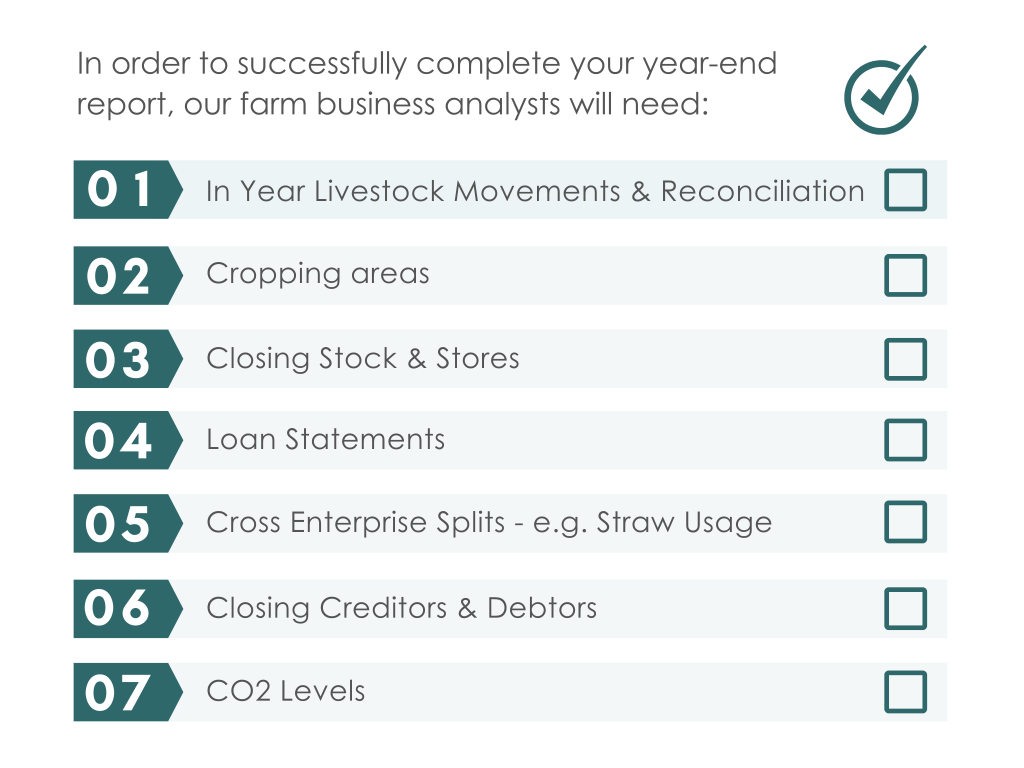By Lydia Thomas
Let’s face it, the financial year has a predictable rhythm, however, that doesn’t make it any less stressful when the deadlines are imminently looming. The year-end period is no exception, adding pressure to what is already a busy time of year on most farms.
For 80% of farm businesses, Spring year-ends are just around the corner and I’m sure are being met with some dread. This doesn’t have to be the case though, particularly if you plan ahead and make time to prepare accordingly.
Year-end success depends on strategic planning, robust processes and organisation. Prepare for the extra workload and think about what information you’ll need to make the process run smoothly. Taking these steps will help to aid with decision making, financing opportunities, loan renewals and facilitate business meetings with consultants, bank managers and discussion groups.
It doesn’t just end there. Multiple actions can be adopted to ease the stress and pressures of completing the financial year-end.
Below are just a few of our top tips:
Don’t leave the valuation forms until the last minute
Save a few hours on the last day of the financial year to walk around the farm and take a stock valuation. Don’t leave it until your next secretary visit as this can affect stock information.
Complete 90% of your calving record before March
There is nothing stopping you from completing April to February’s calving record in advance. Get this out of the way then you only need to complete the last month.
Use BCMS to get a list of current stock numbers and their ages
Animal age groups are a common cause of year-end headaches. Use your BCMS online records to get a printout of all stock on the farm listed by age on the day of your year-end. Your secretary will be able to sort them accordingly if you are struggling.
Have all cheque books to hand at your year-end visit
Often there are cheques missing, or blank stubs that will need reconciling. Have these to hand so that the secretary can look through them if needed. The same goes for bulk payment details – if these are not printed regularly, supplier balances can be out. Have these ready if requested.
Be prepared with bank statements
Your secretary or accountant might request missing bank statements. Be prepared to ring the bank or print missing information using your online banking. If you don’t have statement access online, it’s worth looking into.
Contact banks and HP companies
To ensure capital balances are correct, ask them to send you loan balances. These are often only produced annually, on your financial year-end date.
Collate all your spray records
Not only is this great for the secretary but also aids cross-compliance. It’s often hard to remember which spray went on which crop but spray records should hold this information, helping your secretary to produce accurate gross margin data.
Finally, be prepared for next year
Evaluate how you can make the process easier for the following year – whether that be by implementing something simple like having new folders and dividers ready or completing cropping and livestock records on a monthly and quarterly basis. Both will be valuable going forward.

Getting ahead
Taking the time to get ahead with account preparation will save time and hassle, and could put you in great stead for the next financial year.
Our Farm Business Analysts (FBA’s) are here to help with this process. They can complete harvest and calving information, fertiliser applications, tie up loose ends that have been forgotten during the year and collate information for your accountant. If it sounds like our FBA’s could benefit your business, please get in touch.







